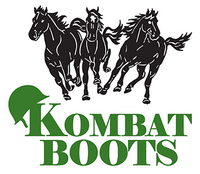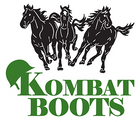Pelleted Brewers Yeast Additive Available for All Classes of Horses
A press release by Dr. Amy Gill, Ph.D. – Equine Nutritionist writing for The Thoroughbred Times
“A completely natural brewers yeast pelleted feed additive named Kombat Boots is available commercially for feeding to horses. The unique pelleting process used to manufacture Kombat Boots provides an extremely palatable and easy to feed form of brewers yeast.
Brewers yeast is a good source of protein and amino acids for horses and contains many other macro and micro minerals and B complex vitamins. In the past, numerous scientific studies have demonstrated the beneficial effects of adding yeast to equine diets. Research has shown that adding yeast to the diets of horses can:
- stimulate and stabilize microbial activity in the hindgut
- reduce incidence of colic and ulceration by maintaining pH balance through colonization of healthy microbes throughout the digestive tract
- improve fiber, calcium and phosphorus digestibility
- improve nutrient composition of milk in lactating mares
- improve digestibility and feed utilization in young horses and aged horses
- increase daily gains in growing horses
- enhance athletic performance by improving aerobic capacity
- improve the quality of hair, skin and hoof
One of the most significant effects of adding yeast to equine rations is the ability to help stabilize the hindgut (cecum and colon) bacterial populations and, as a result, also increase nutrient digestibility. Components of the yeast cell wall prevent the colonization of pathogenic microorganisms in the gut, improve the percentages of useful microorganisms in the intestinal tract, boost immune function and strengthen the structure of the gut wall. Yeast also stimulates the growth of bacteria that utilize lactic acid, which helps to lower lactic acid levels in the hindgut, and increase the number of bacteria that are responsible for the fermentation of fiber. A healthy, stable hindgut is imperative for horses to remain in good condition and prevent disorders such as colic, laminitis and other metabolic syndromes. Many performance horses are fed high starch diets (sweet feeds), and these feeds can cause hindgut acidosis (drop in pH), which often dramatically shifts the microbial populations in the hindgut, causing a disturbance. When this happens, the entire hindgut environment is negatively affected, and the products of microbial fermentation (volatile fatty acids, ammonia, lactic acid) are produced in different proportions and concentrations than what is considered normal. Colic and laminitis can follow an episode of acidosis, and this may be occurring on a sub clinical level in certain individuals every time they are fed a meal high in starch. Studies have shown that when yeast is added to the ration it can help prevent rapid changes in the intestinal ecosystem when high starch diets are fed.
Feeding yeast also enhances the activity of fiber digesting bacteria in the hindgut and increases fiber digestibility. Therefore, more efficient use of the vitamins and minerals derived from the forage portion of the diet is noted when horses are maintained on a diet containing supplemental yeast. This is particularly important in the growing horse because calcium and phosphorus are essential dietary minerals needed for proper bone development. Adding yeast to the rations of growing horses also increases nutrient digestibility, which results in higher daily gains.
Some of the phosphorus found in forages is bound to the plant fiber in the form of phytin phosphorus and is not readily digested and absorbed by the horse. Research studies have shown that there is a 20 percent increase in phosphorus availability when yeast is added to the diet. Yeast stimulates the hindgut bacteria to produce the enzyme phytase, which acts to break down the bond between the fiber and the phytin phosphorus, making it readily absorbable from the hindgut.
Lactating mares fed yeast have higher concentrations of sugars, lipids, total proteins, gross energy and amino acids in their milk and their foals have higher average daily gains due to increased availability of nutrients. Supplemented mares also produce more milk, and foals from supplemented mares grew much faster than foals on non-supplemented mares during their first 4 weeks of life.
Older horses will benefit directly from the addition of yeast due to increased fiber digestion and phosphorus absorption from the large intestine, which commonly deteriorates and loses some absorptive capacity due to aging.
Horses in training appear to benefit when being fed a diet with yeast culture, with lower blood lactate levels before and during exercise, and faster clearance of lactate from the blood following exercise than horses not fed yeast. Supplemented horses also had slower heart rates during exercise, indicating an enhanced athletic fitness level. These results indicate that horses fed yeast have less reliance on glycogen during exercise to provide glucose, as a direct result of better utilization of energy produced from volatile fatty acids (VFA’s). VFA’s are one of the products of microbial fermentation that the horse can utilize for energy production. Enhanced volatile VFA production appears to exert a carbohydrate-sparing effect in the exercising horse.”
Kombat Boots is economical to feed – Ask your local dealer for more information, or call (866) 291-4269.



